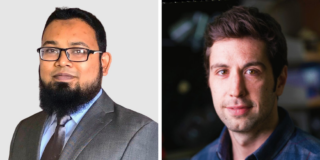Researchers at Boston Children’s Hospital and the Massachusetts Institute of Technology were awarded funding this week by the American Heart Association and The Children’s Heart Foundation to study congenital heart defects.
The jointly funded grants total more than $625,000 and will be distributed among five research projects nationwide.
At Boston Children’s Hospital, Mohammad Arafat Hussain was awarded a grant for work in accelerated brain aging and neurocognitive outcomes in adolescents and young adults with congenital heart defects.
At MIT, Markus Horvath was awarded a grant for work on high fidelity respiratory and flow models of the Fontan physiology to investigate strategies of circulatory support.

Mohammad Arafat Hussain (left), of Boston Children’s Hospital, and Markus Horvath (right), of MIT, are among five researchers to receive funding to study congenital heart defects.
Nearly 2.4 million children and adults live with a congenital heart defect in the U.S. and more infants with congenital heart defects are surviving into adulthood. This is largely due to advancements made through ongoing research.
This is the ninth round of the co-funded Congenital Heart Defect Research Awards program. The American Heart Association and The Children’s Heart Foundation have pledged a total of $14.3 million to fund CHD research over 10 years.
In addition to Boston Children’s Hospital and MIT, the new grants have been awarded to:
- Tri Nguyen, at Stanford University School of Medicine in Stanford, California for work in deciphering the function of CHD genes by mapping them to pathways activated during endothelial cell differentiation.
- Tasneem Ebrahim, at Icahn School of Medicine at Mount Sinai in New York City for work in the role of retinoic acid in cardiac progenitor specification.
- Dr. Joshua Theisen, at the University of Chicago for work in the role of FOXF1 gene as a differentiation timer for cardiac development
“Congenital heart defects are the most common birth defect in the U.S., and by directly funding research in this field, we are investing critical resources for more children to survive into healthy adulthoods,” said Dr. Donald M. Lloyd-Jones, president of the American Heart Association and chair of the department of preventive medicine at Northwestern University Feinberg School of Medicine in Chicago. “The Association and the Children’s Heart Foundation share common priorities in congenital heart defect research investment. Supporting innovative research saves and improves the lives of children and adults with these conditions, and that is of utmost importance to us.”
Nearly 40,000 infants are born with congenital heart defects each year in the United States. About 25% of babies born with a CHD require invasive surgery or treatment in their first year of life.
Research that helps healthcare professionals understand, identify and treat CHDs is helping these babies live longer, healthier lives. While medical advancements have improved over the years, many of these children and their families still face a lifetime of challenges. As many more of these children are now becoming adults, much still remains to learn about life with congenital heart defects.
“Through this partnership and our ongoing commitment to funding research, we’re making a lasting impact on the lives of CHD patients and their families,” said Gail Roddie-Hamlin, president and CEO of The Children’s Heart Foundation. “These new research projects will help bring innovative solutions to improve survival rates and care for individuals living with CHDs.”
Scientists who are conducting research to advance knowledge for prevention and treatment of congenital heart defects are encouraged to submit applications for the next round of funding. For more about the American Heart Association and The Children’s Heart Foundation’s Congenital Heart Defects Research Awards, including deadlines for submitting proposals, please visit professional.heart.org/CHDResearchAwards.
Additional Resources:
- To learn more about congenital heart defects, visit heart.org/CHD.
- For support for parents of young children diagnosed with CHDs or adults living with the impact of a CHD, visit SupportNetwork.heart.org
